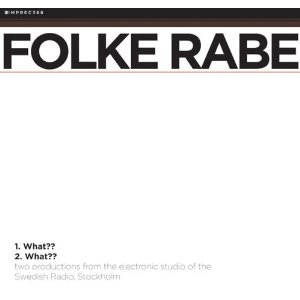Listening to this remarkable album recorded waaaaaaaay back in 1967, I found myself thinking of a recent acting course I had embarked on, and in particular the effect on the body of the various exercises that make up the Alexander Technique, which is designed to help actors (and all public speakers) learn to improve their breathing to improve their range. The results can often be surprising (despite my initial cynicism, I should say). One thing I noted when employing Alexander exercises was the greater sense of my own body, and therefore overall spatial awareness, that resulted. It was as if my proprioception had been increased, and I became more acutely keen to the various parts of my body. I’ve never experienced being in an anechoic chamber, but descriptions I’ve read hint at a similar in-of-body feeling, and I’m starting to see why some people find disciplines such as yoga and pilates so rewarding (I insist on "starting", mind).
I mention all this because What?? seems to engage in something similar with sound. Equally, like many deep drone albums by artists such as Eliane Radigue or Pauline Oliveros, its effect on the listener is as much physical as it is emotional or intellectual. It requires patience and attention and, played at sufficient volume on headphones, it resonates powerfully throughout the body, with various layers of sounds engaging with the listener’s body beyond the ears. The title hints at a questioning of the nature of music and sound, how they occupy space and how individual elements interact with each other. In the liner notes, Rabe speaks of attempting "to hear ‘into’ the different sounds in order to grasp the components that made them up". What?? is effectively an exercise in turning sound inside out, exploring its inner workings in a way reminiscent of scientific experimentation. Hardly surprising, then, to learn that it was recorded at the electronic studio of Swedish Radio, linking Rabe’s work in some ways to that of the BBC Radiophonic Workshop, although the results are strikingly different.
Also in the liner notes, Rabe writes about hearing how the sound from piano notes will vary as they die away (something that British composer Michael Nyman would come to almost a decade later on his more literal Decay Music), and this fascination with the fragile DNA of music results in two equally-named pieces that deal with decay, repetition and sustain, each piece developing over extreme durations where the elements float in and out of each other, layers building up and then peeling back to reveal more, near-identical, layers. The durations allow the music to develop organically and, for the listener, the rewards are momentous. If Rabe modestly speaks of being "concerned with monotony", these two tracks are anything but. Subtle oscillations creep forwards, linger and then depart, but with each repetition new textures avail themselves: a whistling high note here, a deep, reverberating drone there. At times, the build-ups reach breaking point, and it’s no great leap of imagination to feel the connection between the first, 25-minute version of ‘What??’ and the noise wave of the late-90s. The second, 50-minute track is more delicate, but equally stunning, its throbbing tones developing into mesmeric miniature rhythm patterns that evolve symbiotically with each other, as if Folke Rabe is more a spectator than a composer. It’s an approach that would have a lasting impression on the German kosmische scene a few years down the line (I’d be surprised if they’d never heard these tracks), especially Klaus Schulze and Cluster.
Folke Rabe’s approach to drone differs from that of Radigue, Oliveros and LaMonte Young for this very reason, even if he clearly shares a similar dismay at the way Western music evolved in comparison to its Eastern counterpart (Terry Riley’s quip that "Western music is fast because it’s not in tune" springs to mind throughout this album). What?? has a sort of primordial energy, a deceptive simplicity removed from mathematical or philosophical concerns, and comparisons with the great, circular rock of Ash Ra Tempel, Les Rallizes Dénudés and the like are justified. Equally, Rabe was a pal of Swedish psychedelic artist Bo Anders Persson, who would take on his friend’s ideas and approach with his legendary Pärson Sound band. Folke Rabe’s approach to sound may be more considered (and therefore more challenging), but it comes from the same place.
Huge credit must go to Important Records for releasing this stunning document of one of the earliest great masterpieces of electronic drone. What?? is a key example of intellectual and emotional rigour being applied to the very foundations of what sound can achieve in relation to itself and its audience. I would love to hear this in a live setting. Anyone fancy giving Folke Rabe a call?


